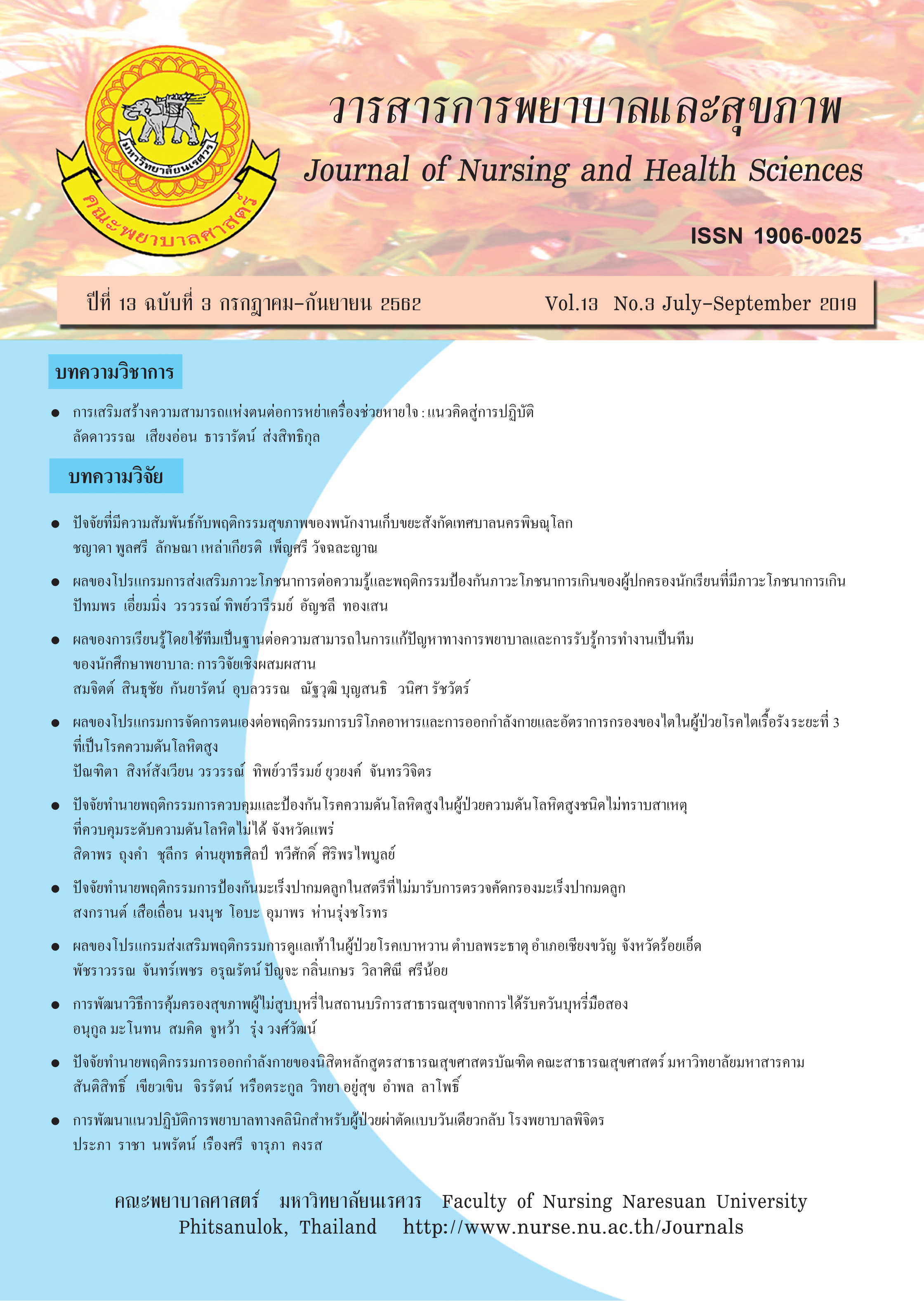ผลของโปรแกรมการส่งเสริมภาวะโภชนาการต่อความรู้และพฤติกรรมป้องกันภาวะโภชนาการเกินของผู้ปกครองและภาวะน้ำหนักตามเกณฑ์ของนักเรียน
Main Article Content
บทคัดย่อ
การวิจัยครั้งนี้เป็นการวิจัยกึ่งทดลอง มีวัตถุประสงค์เพื่อเปรียบเทียบความรู้และพฤติกรรมการป้องกันภาวะโภชนาการเกินของผู้ปกครองนักเรียนชั้นประถมศึกษาปีที่ 1 ที่มีภาวะโภชนาการเกินก่อนและหลังการให้โปรแกรมในกลุ่มทดลอง และหลังการให้โปรแกรมระหว่างกลุ่มทดลองและกลุ่มควบคุม โดยใช้ระยะเวลาในการจัดโปรแกรม 12 สัปดาห์โดยวิธีการเลือกกลุ่มตัวอย่างแบบเจาะจงจำนวน 34 คน เครื่องมือที่ใช้ในการวิจัยคือโปรแกรมการส่งเสริมภาวะโภชนาการ ประยุกต์จากแบบจำลองข้อมูล แรงจูงใจ และทักษะพฤติกรรม (Information-Motivation-Behavioral Skills [IMB] model) ของฟิชเชอร์ และฟิชเชอร์ เครื่องมือที่ใช้ในการเก็บรวบรวมข้อมูล ประกอบด้วยแบบสอบถามเกี่ยวกับข้อมูลทั่วไปของเด็กวัยเรียนและครอบครัว แบบสอบถามเกี่ยวกับความรู้เรื่องภาวะน้ำหนักเกินและพฤติกรรมป้องกันภาวะน้ำหนักเกิน มีการตรวจสอบความเที่ยงและความตรงของแบบสอบถามโดยใช้วิธีของคูเดอร์- ริชาร์ดสันได้ค่าเท่ากับ 0.71และใช้วิธีวิเคราะห์สัมประสิทธิ์ครอนบาคเท่ากับ 0.723 ผู้วิจัยดำเนินการเก็บรวบรวมข้อมูลด้วยตนเอง วิเคราะห์ข้อมูลโดยโปรแกรมสำเร็จรูปทางสถิติหาค่าร้อยละ ค่าเฉลี่ย ใช้วิธีวิเคราะห์ด้วยสถิติ Paired t-test และ Independent t-test ผลการวิจัยพบว่าค่าเฉลี่ยคะแนนความรู้การป้องกันภาวะน้ำหนักเกินในเด็กวัยเรียนของผู้ปกครองของกลุ่มทดลองหลังการทดลองสูงกว่าก่อนการทดลองอย่างมีนัยสำคัญทางสถิติที่ระดับ .05 และหลังการทดลองระหว่างกลุ่มทดลองและกลุ่มควบคุมสูงกว่าก่อนการทดลองอย่างมีนัยสำคัญทางสถิติที่ระดับ .05 และค่าเฉลี่ยคะแนนพฤติกรรมของผู้ปกครองในการป้องกันภาวะน้ำหนักเกินในเด็กวัยเรียนของกลุ่มทดลองสูงกว่าก่อนการทดลองอย่างมีนัยสำคัญทางสถิติที่ระดับ .05 และหลังการทดลองระหว่างกลุ่มทดลองและกลุ่มควบคุมไม่แตกต่างกัน
Article Details
เอกสารอ้างอิง
Dawdaung, P., & Loysongkorahor, J. (2014). Guidelines for controlling obesity prevention in school children. Nonthaburi: The War Veterans Organization Printing Office. [In Thai].
Department of Health. (2015). Concern of School age children become more obese 36%. Retrieved 12 March 2017 from https://www.thaihealth.or.th/Content/27496-2036.html. [In Thai].
Fisher, J.D., & Fisher, W.A. (1992). Changing AIDS risk behavior. Psychological Bulletin, 111(3), 455–474.
Hmahmeng, N., onchalernlam, P., & Pinit, S. (2016). The study of nutrition & student's food consumption behavior in diamond health promoting schools at regional health promotion center 9 Phitsanulok. Retrieved 23 February 2017 from http://hpc2.anamai.moph.go.th/research/index.php/2558/108-9. [In Thai].
Jintana, P. (2016). Information-motivation-behavioral skills program improved phosphate binder adherence in patients with chronic hemodialysis. Journal of Nursing Science, 34(2), 26. Retrieved 23 October 2017 from https://www.tci-thaijo.org/index.php/ns/article/view/62169/51202. [In Thai].
Kingmala, C. (2015). Effect of a pregnancy prevention program for female adolescents. Journal of Boromarajonani College of Nursing Bangkok, 31(3), 25. Retrieved 15 April 2017 from https://www.tci-thaijo.org/index.php/bcnbangkok/article/view/56407/52775. [In Thai].
Leularb, K. (2016). Effects of information-motivationbehavioral skill program on the severity of knee osteoarthritis and body weight on overweight older persons with knee osteoarthritis. Kuakarun Journal of Nursing,23(2), 149. Retrieved 3 March 2017 from http://www.kcn.ac.th/KCN-Journal/Journal/22559/Job%2020170721_9.pdf. [In Thai].
Pichairat, A., Lertwanawattana, J., & Chuaykaew, B. (2016). The effect of promotion role of family program on the knowledge behaviors for weight control among the overweight school-age children, The 1st National Conference. RTUNC 2016; July 29, 2016., 1(1), 1784-1793 . Retrieved 12 August 2017 from http://administer.pi.ac.th/uploads/eresearcher/upload_doc/2016/proceeding/1471575236948762004917.pdf. [In Thai].
Phitsanulok Primary Educational Service Area Office 1. (2017). Weight and height information of students in Phitsanulok primary Educational Service Area Office 1. Phitsanulok: Phitsanulok Primary Educational Service Area Office 1. [In Thai].
Puwanant, M. (2013). Knowledge isuue of nutrition in children and adolescents. Nonthaburi: Beyond Enterprise. [In Thai].
Rattanachuaek, S., Taweekul, P., Aimaopas, A., & Sutasworawut, A. (2015). Guidelines for the prevention and treatment of obesity in children in 2015. Retrieved12 March 2017 fromhttp://www.thaipediatrics.org/Media/media-20161208151655. pdf. [In Thai].
Sirikulchayanonta, C. (2011). Child nutrition disorders obesity. Bangkok: Best Graphic Press. [In Thai].
Srisatidnarakul, B. (2014). The methodology in nursing research. Bangkok: U and I Intermedia. [In Thai].
Suwanpatikon, K. (2015). Nursing practice guidelines for overweight management. Bangkok: Wattana Printing. [In Thai].
Thavorncharoensap, M., Suksomboon, N., Pitayatienanan, P., Yothasamut, J., Aekplakorn, W., & Teerawattananon, Y. (2011). Impact of obesity on economics and quality of life in Thailand. Nonthaburi: The Graphico Systems. [In Thai].
Thingchin, A. (2009). Selected facors related to overweight level among overweight elementary school children, grade 4-6, urban area, Phitsanulok Province. Master Thesis (Nursing), Naresuan University, Phitsanulok. [In Thai].
Thaiyapirom, N. (2012). Health promotion for school-age children. In Klunklin, P. (Ed.). Health promotion for children of all ages (pp. 123-152). Khon Kaen: Klang nana withaya. [In Thai].
Tipwareerom, W., Powwattana, A., Lapvongwatana P., & Crosby, RA. (2011). Effectiveness of a model of risky sexual behavior prevention among adolescent boys in Thailand. The southeast asian journal of tropical medicine and public health, 42(3),726.


